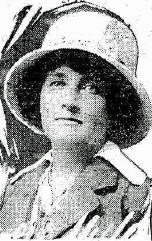Paula O. Jakobi | |
|---|---|
 | |
| Born | Paula Owen 1870 |
| Died | July 12, 1960 (aged 89–90) |
| Nationality | American |
| Occupation(s) | Playwright, Suffragist |
| Spouse | Leo C. Jakobi |
Paula O. Jakobi (1870 – July 12, 1960) [1] was an American suffragist and playwright.
Career and activism
Jakobi was a suffrage leader in New York City, affiliated with the National Woman's Party. She organized an event at Cooper Union in 1914, where Lincoln Steffens, Zona Gale, Edna Ferber and many other pro-suffrage authors gave readings and sold autographed books for the cause. [2] [3] Jakobi studied prison reform at the Massachusetts women's reformatory in Framingham, and wrote with urgency the lives of destitute women. [4] She was also, for three years, the opera critic for a New York newspaper. [5]
Jakobi was a member of Heterodoxy, a feminist club based in Greenwich Village. She and Heterodoxy founder Marie Jenney Howe wrote a satirical one-act play, Telling the Truth at the White House (1917), based on suffrage protests in Washington D. C. [6] A few months after the play was published, Jakobi was arrested in November 1917 while protesting at the White House; she was sentenced to thirty days at Occoquan Workhouse. While at Occoquan, she refused food, and was force fed by prison officials. [7] She described the experience in stark terms that were quoted in suffrage literature of the time, and for decades after:
"There was no light in the room, only one in the corridor. Three of us were thrown into every cell. There was a single bed in each room and a mattress on the floor. The floors were filthy as were the blankets. In the morning we were roughly told to get up. No facilities for washing were given us. Faint, ill, exhausted, we were ordered before the superintendent. It was eight o'clock and we had had no food since the preceding day at twelve. None had been offered us." [8] [9] [10]
Jakobi wrote other short plays, including The President (1921), Poet of His People (1917), Donna Juanna (with Marie Jenney Howe, 1917), The Dragon's Tooth (1917), Chinese Lily (1915, set in a women's prison), and And Ye Gave Me a Stone (1915). [11] [12]
When she was in her eighties, Jakobi wrote a new play The Adamses (1952), about sharecroppers, which was produced by the Hedgerow Theatre near Philadelphia. [13]
Personal life
Paula Owen married Leo C. Jakobi, a manufacturer. They had two daughters, Audrey and Ruth. In 1904, Paula O. Jakobi was widowed after a long separation, when Leo died by suicide. [14] [15] She died on July 12, 1960. [1]
References
- ^ a b "Paula O. Jakobi (1870–July 12, 1960)". Turning Point Suffragist Memorial. April 2015. Retrieved 6 September 2019.
- ^ "Literary Lights are Lined Up for Votes," New York Tribune (January 11, 1914): 9.
- ^ "Suffragists Told to Use Dynamite," New York Tribune (January 13, 1914): 4.
- ^ Paula Jakobi, "The Lodging-House," The Outlook (April 21, 1915): 936-938.
- ^ "Contributors to the November Forum," The Forum 54(1915): 771.
- ^ Mary Chapman and Angela Mills, eds., Treacherous Texts: U. S. Suffrage Literature 1846-1946 (Rutgers University Press 2011): 275. ISBN 0813549590
- ^ Noelia Hernando Real, "A Luncheon for Suffrage: Theatrical Contributions of Heterodoxy to the Enfranchisement of the American Woman," Revista de Estudios Norteamericanos 15(2012): 83.
- ^ Inez Haynes Gilmore, The Story of the Women's Party (Harcourt Brace 1921): 275-278.
- ^ Caroline Katzenstein, Lifting the Curtain: The State and National Woman Suffrage Campaigns in Pennsylvania as I Saw Them (Dorrance 1955): 252.
- ^ Katie Marsico, Women's Right to Vote: America's Suffrage Movement (Benchmark Books 2010): 42. ISBN 0761449809
- ^ Paula Jakobi, "Chinese Lily," The Forum 54(November 1915): 551-566.
- ^ Paula Jakobi, "And Ye Gave Me a Stone," The Outlook (1915): 151-153.
- ^ "Hedgerow Theater Features Negro Cast," Jet (April 3, 1952): 64.
- ^ "Melancholy Patient Suicide; Leo Jakobi Shoots Himself at Home of His Physician," New York Times (July 26, 1904): 14.
- ^ "Leo Jakobi's Will Filed," New York Times (July 28, 1904): 14.
- 1870 births
- 1960 deaths
- 20th-century American dramatists and playwrights
- 20th-century American non-fiction writers
- 20th-century American women writers
- American music critics
- Suffragists from New York (state)
- American women dramatists and playwrights
- American women journalists
- Opera critics
- American women music critics
- Writers from New York City
- National Woman's Party activists
